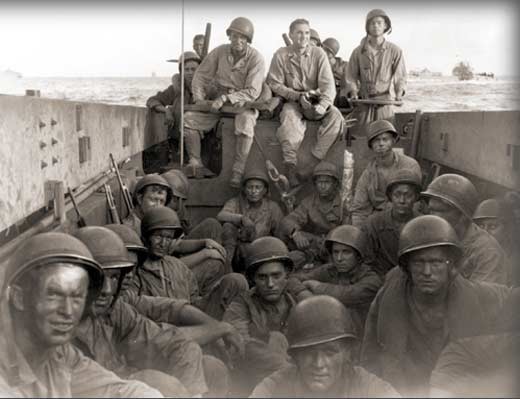Every year as Memorial Day nears, my attention turns to the Indy 500, NBA playoffs, and daytime baseball, where the beer is colder and the crack of the bat seems to sound more natural, like summer really has arrived. But these days, such thoughts are interrupted by images from The Pacific, HBo’s 10-part series that wrapped its initial run on May 16th.
Produced by Tom Hanks, the series displayed the drama, horror, heartache, and ultimate victory for the United States and its allies in a theater of World War II that has long played second fiddle for American historians to the conflict in Europe. It opened my eyes, let me tell you, and reminded me how very much the world has changed in merely 65 years.

The Marines we follow in The Pacific — men like John Basilone, Robert Leckie, and Eugene Sledge — were almost entirely between the ages of 18 and 25. Which places them in the same demographic as so many of our current sports stars. Instead of cutting to daylight on a college gridiron, though, these men dodged mortar and bullets in seizing one airfield after another. And some dodged better than others.
Instead of signing eight-figure contracts before they wear a major-league uniform, the Marines of World War II signed commitments to a battle they knew was worth fighting, but one in which the enemy was entrenched, armed to the teeth, and committed to die in defending patches of earth no American had heard of before Pearl Harbor was attacked. The invasion of Normandy was a bloody atrocity . . . and a success. With every episode of The Pacific, we were reminded how many more atrocities followed, without the flag-waving that ensued on the coast of France. Listen to the survivors of Guadalcanal, Pelelieu, Iwo Jima, or Okinawa — some of whom were featured in HBO’s series — and you’ll understand these men served in hell. The fact that any of them managed to live normal lives for decades after the bloodshed is purely heroic.
Which brings me back to the world of sports we cheer so passionately today. What if LeBron James (still just 25 years old), instead of being drafted out of high school in 2003 to be the next Michael Jordan, had been drafted into the Army and assigned to duty in Iraq or Afghanistan? What if Stephen Strasburg (21) was learning the ropes near Kandahar, identifying a shapeless enemy, instead of fine-tuning his curveball for when the Washington Nationals finally promote him to the majors? How quickly — three generations — we forget that athletic stars once served in the military when they were stars. Bob Feller, Hank Greenberg, Joe DiMaggio, Stan Musial, and Ted Williams all served in World War II on their way to the Baseball Hall of Fame. (According to the Williams legend, there was a time when the finest hitter in the world, the finest fighter pilot in the world, and the finest fisherman in the world were all the same man.)
Tom Brokaw, among others, has called those who helped America win World War II our “greatest generation.” If such is the case, I’m certainly among our country’s luckiest generation. Too young for Vietnam and too old to begin a military career on September 11, 2001, my generation is an American rarity in that we never had to seriously decide between civilian life and defending a cause against an armed enemy. Which makes me admire the young men and women who choose that battle today far beyond a casual salute or a doffed hat when “The Star-Spangled Banner” is played. Unlike many American troops in World War II, U.S. forces today are voluntary, which somehow adds a layer of heroism if you ask me.
Nine years ago, I wrote a retrospective on Memphis sports that I titled “Heroes in Time.” A Memphis magazine reader took it the wrong way and wrote me a stern letter, one in which he clarified that “heroes” are soldiers, not athletes. And that I shouldn’t confuse the two. He wasn’t entirely correct, as heroes can be found almost anywhere we choose to find them: comic books, novels, the silver screen, even a ballpark. But the kind of heroes who shape the world we live in and establish freedoms still unknown in too many corners of the globe . . . these are indeed the John Basilones and Eugene Sledges of mankind.
I plan on being at AutoZone Park for the Redbirds’ Memorial Day game, with family visiting from New England. The cold beer will taste good, and the conversations I have with my daughters will be relished. But my thoughts will stray this year, as I’ll be remembering American heroes, past and present. I’d like to think a holiday — in their honor — spent with my loved ones is a small salute.